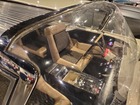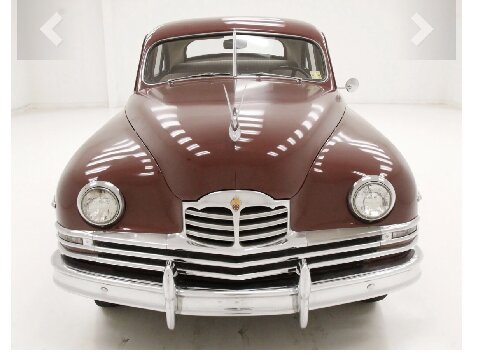|
Re: How is the displacement of an engine calculated?
|
||||
|---|---|---|---|---|
|
Home away from home

|
CID = .785 x bore x bore x stroke x # of cylinders.
So a 374 has a bore of 4.125 and stroke of 3.5: Cid = .785 x 4.125 x 4.125 x 3.5 x 8 = 374. The size of combustion chamber in the head has no bearing on the generaly accepted displacement measurement. Size of combustion chamber determines compression ratio. Yes, shorten the stroke and CID gets smaller ASSUMING bore does NOT change. Compression ratio will suffer too. HP ratings are only approximate and vary widely by methods and measurements used. Look up HP in dictionary or encyclopedia. There is a specific definition and measurement for HP. Manufacturer claims can be ANYTHING they want them to be. There is a test u can run yourself using your own car to measure HP at REAR wheels. IT's pretty ez.
Posted on: 2012/9/5 19:22
|
|||
|
VAPOR LOCK demystified: See paragraph SEVEN of PMCC documentaion as listed in post #11 of the following thread:f
https://packardinfo.com/xoops/html/modules/newbb/viewtopic.php?topic_id=7245 |
||||
|
||||
|
Re: How is the displacement of an engine calculated?
|
||||
|---|---|---|---|---|
|
Home away from home
|
cuz .785 is approx pi/4
Posted on: 2012/9/5 22:42
|
|||
|
||||
|
Re: How is the displacement of an engine calculated?
|
||||
|---|---|---|---|---|
|
Home away from home

|
If someone didn't like the first equation then they can use this one:
CID = 3.1416 x 1/2 bore x 1/2 bore x stroke x number of cylinders. Either equation will produce the same results every time. The equations work for ANY kind of a cylinder.
Posted on: 2012/9/6 6:41
|
|||
|
VAPOR LOCK demystified: See paragraph SEVEN of PMCC documentaion as listed in post #11 of the following thread:f
https://packardinfo.com/xoops/html/modules/newbb/viewtopic.php?topic_id=7245 |
||||
|
||||
|
Re: How is the displacement of an engine calculated?
|
||||
|---|---|---|---|---|
|
Home away from home

|
What is taxable HP? I have no idea, that's a foreign concept to me. But maybe the following info could help you figure it out.
Horsepower is a function of force times speed. The formula is "torque x rpm / 5252 = HP" If your engine puts out 345 foot pounds of torque at 2300 rpm its horsepower rating is 151. If it's 200 ft lbs at 4500 it's rating is 171hp. So, which one has more power? Compare the ratings of the Packard engines and modern engines. The long stroke low rpm engines have their peak torque at a relatively rpm. And the HP ratings show that. Modern engines develope their torque at a much higher rpm so they end up with much high ratings.
Posted on: 2012/9/6 7:22
|
|||
|
1954 Clipper Super Touring Sedan -5462
|
||||
|
||||
|
Re: How is the displacement of an engine calculated?
|
||||
|---|---|---|---|---|
|
Forum Ambassador
|
Here's the answer on the taxable horsepower question. Both the same but given by two knowledgeable members.
https://packardinfo.com/xoops/html/modules/newbb/viewtopic.php?post_id=98469#forumpost98469 https://packardinfo.com/xoops/html/modules/newbb/viewtopic.php?post_id=84083#forumpost84083
Posted on: 2012/9/6 8:23
|
|||
|
Howard
|
||||
|
||||
|
Re: How is the displacement of an engine calculated?
|
||||
|---|---|---|---|---|
|
Home away from home

|
http://en.wikipedia.org/wiki/Horsepower
Scroll down about 2/3 of the way past all of the clinical jargon. There is chart that gives specific units of measure for ONE UNIT of horse power (mechanical, electrical etc. IIRC the mechanical can be converted to electricl because Watts can be converted. The only way to know accurate horse power AT THE FLYWHEEL is to mount engine on a dynamomter and test under a vairety of conditiosn and fuels and engine rpm. Dynos are either mechanical (slinging governor weights) or Elctrical (engine turning electric generator under load measuring watts). Such terms as "taxable", SAE, etc etc are misleading terms. And probably grossly over embellished and deliberately complicated so as to allow a wide range for advertising, marketing, insurance, government etc etc and promotion industry interests. If HP is not stated in pounds x distance per time interval Which i believe can also be converted watts then any other HP rating is simply a mish-mash of convoluted and confusing bragging rights.
Posted on: 2012/9/6 8:39
|
|||
|
VAPOR LOCK demystified: See paragraph SEVEN of PMCC documentaion as listed in post #11 of the following thread:f
https://packardinfo.com/xoops/html/modules/newbb/viewtopic.php?topic_id=7245 |
||||
|
||||
|
Re: How is the displacement of an engine calculated?
|
||||
|---|---|---|---|---|
|
Home away from home
|
v8's comments are solid engineering - unit conversions for the same measurement - power or volume (displacement).
Tax HP is not an engineering calculation, it's a tax formula with no real grounding. It changes from one taxing authority to another. Quick old exampl: 1983 BMW 320 and Alfa Spider have the same real hp in euro spec. One is 8 fiscal HP (French), the other 11.
Posted on: 2012/9/6 10:56
|
|||
|
||||









